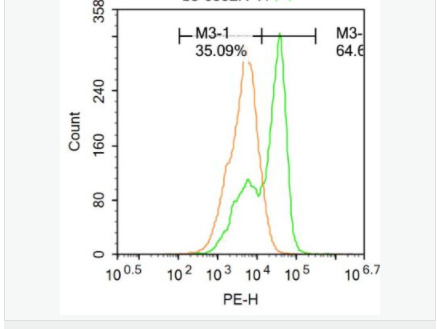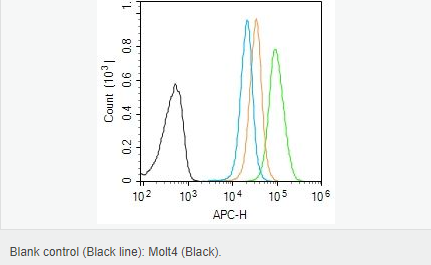

貨號
產(chǎn)品規(guī)格
售價
備注
BN41222R-100ul
100ul
¥2360.00
交叉反應(yīng):Human(predicted:Mouse,Rat,Pig,Horse) 推薦應(yīng)用:WB,IHC-P,IHC-F,IF,Flow-Cyt,ELISA
BN41222R-200ul
200ul
¥3490.00
交叉反應(yīng):Human(predicted:Mouse,Rat,Pig,Horse) 推薦應(yīng)用:WB,IHC-P,IHC-F,IF,Flow-Cyt,ELISA
產(chǎn)品描述
| 英文名稱 | HSD17B6 |
| 中文名稱 | 17-β-羥脫氫酶6抗體 |
| 別 名 | 17-beta-HSD 6; 17-beta-HSD6; 17-beta-hydroxysteroid dehydrogenase type 6; 3 hydroxysteroid epimerase; 3(alpha >beta) hydroxysteroid epimerase; 3(alpha >beta) hydroxysteroid epimerasel; 3-alpha->beta-HSE; 3-alpha->beta-hydroxysteroid epimerase; H17B6_HUMAN; HSD17B6; HSE; Hydroxysteroid (17 beta) dehydrogenase 6; Hydroxysteroid (17 beta) dehydrogenase 6 homolog (mouse); Hydroxysteroid 17 beta dehydrogenase 6; NAD+ dependent 3 alpha hydroxysteroid dehydrogenase 3 hydroxysteroid epimerase; NAD+ dependent 3 alpha hydroxysteroid dehydrogenase; Oxidative 3 alpha hydroxysteroid dehydrogenase; Oxidative 3-alpha hydroxysteroid dehydrogenase; Oxidoreductase; Retinol dehydrogenase; RODH; SDR9C6;Short chain dehydrogenase/reductase family 9C, member 6. |
| 研究領(lǐng)域 | 信號轉(zhuǎn)導(dǎo) 生長因子和激素 |
| 抗體來源 | Rabbit |
| 克隆類型 | Polyclonal |
| 交叉反應(yīng) | Human, (predicted: Mouse, Rat, Pig, Horse, ) |
| 產(chǎn)品應(yīng)用 | WB=1:500-2000 ELISA=1:5000-10000 IHC-P=1:100-500 IHC-F=1:100-500 Flow-Cyt=1ug/Test IF=1:100-500 (石蠟切片需做抗原修復(fù)) not yet tested in other applications. optimal dilutions/concentrations should be determined by the end user. |
| 分 子 量 | 33kDa |
| 細胞定位 | 細胞漿 細胞膜 |
| 性 狀 | Liquid |
| 濃 度 | 1mg/ml |
| 免 疫 原 | KLH conjugated synthetic peptide derived from human HSD17B6:61-160/317 |
| 亞 型 | IgG |
| 純化方法 | affinity purified by Protein A |
| 儲 存 液 | 0.01M TBS(pH7.4) with 1% BSA, 0.03% Proclin300 and 50% Glycerol. |
| 保存條件 | Shipped at 4℃. Store at -20 °C for one year. Avoid repeated freeze/thaw cycles. |
| PubMed | PubMed |
| 產(chǎn)品介紹 | The protein encoded by this gene has both oxidoreductase and epimerase activities and is involved in androgen catabolism. The oxidoreductase activity can convert 3 alpha-adiol to dihydrotestosterone, while the epimerase activity can convert androsterone to epi-androsterone. Both reactions use NAD+ as the preferred cofactor. This gene is a member of the retinol dehydrogenase family. [provided by RefSeq, Aug 2013] Function: NAD-dependent oxidoreductase with broad substrate specificity that shows both oxidative and reductive activity (in vitro). Has 17-beta-hydroxysteroid dehydrogenase activity towards various steroids (in vitro). Converts 5-alpha-androstan-3-alpha,17-beta-diol to androsterone and estradiol to estrone (in vitro). Has 3-alpha-hydroxysteroid dehydrogenase activity towards androsterone (in vitro). Has retinol dehydrogenase activity towards all-trans-retinol (in vitro). Can convert androsterone to epi-androsterone. Androsterone is first oxidized to 5-alpha-androstane-3,17-dione and then reduced to epi-andosterone. Can act on both C-19 and C-21 3-alpha-hydroxysteroids. Subcellular Location: Microsome membrane; Peripheral membrane protein; Lumenal side. Early endosome membrane; Peripheral membrane protein; Lumenal side (Potential). Tissue Specificity: Detected in liver and prostate (at protein level). Detected in adult liver, lung, brain, placenta, prostate, adrenal gland, testis, mammary gland, spleen, spinal cord and uterus. Detected in caudate nucleus, and at lower levels in amygdala, corpus callosum, hippocampus, substantia nigra and thalamus. Detected in fetal lung, liver and brain. Similarity: Belongs to the short-chain dehydrogenases/reductases (SDR) family. SWISS: O14756 Gene ID: 8630 Database links: Entrez Gene: 8630 Human Entrez Gene: 27400 Mouse Omim: 606623 Human SwissProt: O14756 Human SwissProt: Q9R092 Mouse Unigene: 524513 Human Unigene: 26719 Mouse Unigene: 10857 Rat Important Note: This product as supplied is intended for research use only, not for use in human, therapeutic or diagnostic applications. |

